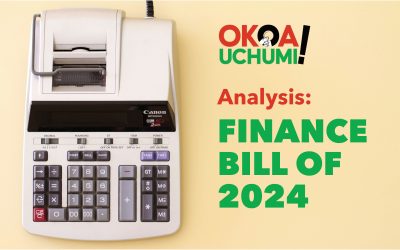We, the Okoa Uchumi Campaign partners and citizens from different parts of Kenya dedicated to strengthening public participation and social accountability in the public debt process are deeply concerned by the Government’s recently released estimated budget for the 2024/25 FY and the Finance Bill 2024.
The current trajectory of rising taxes poses a dire threat to citizens’ access to vital services, essential for the full realization of their fundamental rights and freedoms. As staunch advocates for human rights and the interests of marginalised members of society, we express profound concern over the escalating cost of living, compounded by punitive, unattainable, and unpredictable tax policies. It is deeply troubling to witness significant budget reductions averaging 11% in critical sectors such as education, research, social protection, disaster response, and agriculture. Meanwhile, certain Ministries, Departments, and Agencies (MDAs) within the executive are experiencing budget expansions. This imbalance not only jeopardizes the well-being of citizens but also undermines the government’s duty to prioritize essential services that uphold the dignity and prosperity of all individuals.
Whereas, Article 10 of the Constitution identifies public participation as one of the fundamental principles of good governance, it is very disappointing to be invited to a tokenistic, meaningless and exclusive public participation exercise as currently conducted by the government. It is a worrying trend that citizens’ voices do not find their way into the final policies approved by parliament despite being invited to give their opinions. It is this very Hon Kuria-led-committee that rejected over 63% (Twaweza EA, CFA Report 2023) of citizens’ views on the Finance Act 2023 and once again we are staring at an exercise that is meant to tick boxes. Further, there has been no deliberate efforts by parliament to allocate sufficient resources to facilitate constituency-based all inclusive public participation to afford Kenyans from all walks of life an opportunity to share their opinions and views. Without addressing the teething problems bedevilling our public participation framework and total disregard of public opinions by the parliament, Kenyans will continue to be taken for a ride and their rights violated with impunity.
The Finance Bill, 2024
The non-citizen-focused budget is proposed to be financed by increased taxes to Kenyan taxpayers without commensurate investment in apt service delivery; thus, the burden on Kenyans is set to further worsen if the Finance Bill, 2024 is passed into law. The Finance Bill, 2024 proposes unfair, unjust and harsh clauses which will be to the detriment of the common mwananchi. The Bill is keen to impose heavy tax burdens on the common mwananchi by attacking every aspect of their lives, from the food they eat for health and spiritual communion, to the cars they use to travel either as commuters or owners, the communication sector that is a major source of social cohesion and health, and the banking sector, particularly mobile banking, that drives most economic transactions in Kenya. A Kenyan taxpayer is staring at a short, miserable life with a raft of violations from the government.
Despite the government’s elaborate plans to increase the tax burden, they have not reciprocated the same energy towards the fight against revenue leakages through corruption, wastage, illicit trade and money laundering. According to the Ethics and Anti-Corruption Commission, Kenya loses Ksh. 608 billion/= (7.8% of the country’s GDP) to corruption annually. The Corruption perception index 2023 places Kenya at a score of 31/100, which shows deterioration in the Kenya anti-corruption efforts. It is under this premise that the Okoa Uchumi asserts that continued taxation without accountability is extortion. An attempt by the government to meet its debt obligations, some of which are odious debt and hence not legitimate and should not be a burden to the citizens. The coalition members, oppose a number of the proposals that are problematic and inconsiderate of the current economic situation as follows:
- Enshrining a proposal exempting KRA from the constraints of the Data Protection Act in accessing taxpayers’ data. This is a flagrant violation of one’s right to privacy as set out under Article 24 (2) of the Constitution of Kenya, 2010. There are high chances of surveillance for taxation purposes to be used for persecution.
- Proposal to remove gluten bread and unleavened bread from VAT while also removing VAT zero rating on the supply of ordinary bread, milk, cream and all inputs and raw materials produced both locally and imported. This is bound to increase these items’ costs, and the majority will not be able to afford them. This will be an abuse of the government’s duty to ensure that food is available and accessible. A clear violation of the right to food.
- Proposals to introduce a tax on motor vehicles at 2.5% of the value of the vehicle. The implication of this is that it is likely to increase the tax burden of citizens. This tax is problematic because it is not progressive in nature because the minimum tax payable will be Kshs. 5000 hence owners whose cars are less than Kshs. 200,000 will pay more than 2.5% of the value of their vehicles. On the other hand, those whose vehicles are more than Kshs. 4,000,000 will pay a lower tax rate since this tax is capped at Kshs.100,000. This tax is unjust and burdensome to middle and low-income earners.
- The proposal to empower KRA to require taxpayers to integrate eTIMS. Failure to comply with this requirement will result in a monthly penalty not exceeding Kshs. 2 million. This will mainly target and hurt small businesses since large businesses are already integrated with KRA systems.
- The proposal is to increase the import declaration fee from 2.5% to 3%, which will increase the cost of imported goods.
- Proposal to increase the excise on telephone and internet data services. This comes at a time when the government declared its support for the digital world. Imposing such a tax will hinder many from accessing information purposes such as education and current affairs and will also impact the ease of communication.
We wish to highlight and bring to attention the negative effects that the budget estimates for the 2024/25 FY and the Finance Bill, 2024 will have on public service delivery, and the economy at large. The protest on some proposals of the Finance Bill 2024 are grounds to show that Kenyans can shape the fiscal discourse in our country as provided for in our Public Finance Management Act, 2012 and the Constitution of Kenya. We desire to see a country where accountability is highly valued and where talks on fiscal consolidation are led by the Executive and the Legislature in a manner that is dignified, justified and takes into account the welfare of an ordinary Kenyan Taxpayer.
The government should explore alternative measures to meet its revenue collection and stop overtaxing citizens and businesses. We urge Members of Parliament to reject the proposals that seek to overtax the already suffering Kenyan. Efforts should also be directed to tax compliance on the existing taxes and a pursuit for accountability of all revenue collected. Further, the government must demonstrate by deed that it is committed to fight corruption, wastage and illicit financial flows.
Based on this, Okoa Uchumi will continue amplifying their proposals as submitted to parliament by the people. Additionally, the campaign will mobilise all Kenyan citizens to inform their members of Parliament on their stand on the finance bill 2024.
For more information, contact Mulayi Muni via mulayi.muni@tisa.or.ke
Sincerely,
The undersigned Okoa Uchumi Campaign Members:
- ActionAid International Kenya
- African Forum and Network on Debt and Development (AFRODAD)
- Amnesty International Kenya
- Bunge Mashinani School of Governance
- Centre for Fiscal Affairs
- Centre for Economic Governance(CEG)
- Centre for Enhancing Democracy and Good Governance (CEDGG)
- Christian Aid Kenya
- Community Advocacy and Awareness Trust (CRAWN Trust)
- EACHRights
- East Africa Tax and Governance Network
- Fight Inequality Alliance Kenya
- IBON Africa
- Institute of Public Finance
- International Budget Partnership Kenya (IBPK)
- Inuka Kenya Ni Sisi!
- Katiba Institute
- Kenya Human Rights Commission (KHRC)
- Muslims For Human Rights (MUHURI)
- National Democratic Institute
- National Taxpayers Association (NTA)
- Okoa Mombasa
- Oxfam Kenya
- Pawa254
- REMUSI Housing
- Social Justice Centers
- The Hummingbird Grassroot Kenya
- The Institute for Social Accountability (TISA)
- The Kenyan Section of the International Commission of Jurists (ICJ Kenya)
- Transparency International Kenya (TI-Kenya)
- Twaweza East Africa
The Okoa Uchumi campaign is a civil society platform committed towards working with stakeholders to resolve Kenya’s public debt crisis. The campaign advocates for balanced and equitable budgets as a means of achieving debt sustainability and economic inclusion. The campaign seeks to bolster constitutional safeguards in public debt management and to push for the accountability of political leaders in public debt management.


